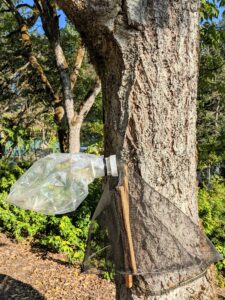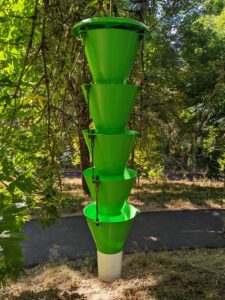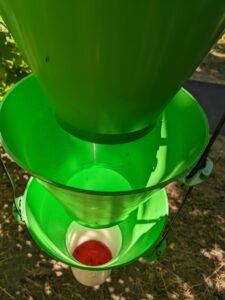Potential for Invasive Pests at the Arboretum
Hoyt Arboretum works to conserve over 2,000 tree species from around the world! While having such a large diversity of trees is an incredible asset for an arboretum collection, it also means that it is highly probable that the Arboretum will be one of the first places in the Portland Metro area for a destructive tree pest or pathogen to be transported and to establish.
Due to this impending threat to our trees, the Arboretum began a community science project in 2021 focused on the early detection of three insect pests: emerald ash borers, spotted lanternflies, and Japanese beetles.
What Do Our Community Scientists Do?
After an initial training session, each community scientist volunteer is assigned an insect trap in a specific tree or site at the Arboretum, and then they visit those traps every week during the active season to examine trap contents and to report their observations in a digital form.
Each volunteer brings a small kit that includes a hand lens, a collection tube, and an identification guide. If anything looks suspicious, the specimen can be submitted to Hoyt staff for a closer look under a microscope.






Current Results:
In these past two years, volunteers have monitored 6 insect traps, and we have had 11 regular volunteers who reported 287 observations!
So far, none of the three insect pests have been detected at the Arboretum, but we remain ever vigilant as Japanese beetles and emerald ash borers have been detected nearby. Having an early detection program does not guarantee that we will be able to protect our trees from all of these pests, but it does mean that once they are detected, we can take steps to better protect our trees and to slow their spread.
Future Forward!
Thank you to our community scientists who act as our first line of defense against these invasive pests. This project runs from mid-May to October with training sessions scheduled in the spring.
Contact us at [email protected] if you’re interested in participating.
The future looks its brightest when we work together!
